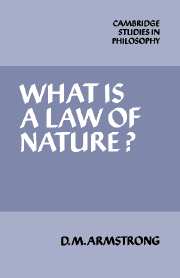Book contents
- Frontmatter
- Contents
- Acknowledgements
- PART I A critique of the Regularity theory
- PART II Laws of nature as relations between universals
- 6 Laws of nature as relations between universals
- 7 Functional laws
- 8 Uninstantiated laws
- 9 Probabilistic laws
- 10 Further considerations concerning the form of laws
- 11 Are the laws of nature necessary or contingent?
- Conclusions
- Works cited
- Index
11 - Are the laws of nature necessary or contingent?
Published online by Cambridge University Press: 05 June 2012
- Frontmatter
- Contents
- Acknowledgements
- PART I A critique of the Regularity theory
- PART II Laws of nature as relations between universals
- 6 Laws of nature as relations between universals
- 7 Functional laws
- 8 Uninstantiated laws
- 9 Probabilistic laws
- 10 Further considerations concerning the form of laws
- 11 Are the laws of nature necessary or contingent?
- Conclusions
- Works cited
- Index
Summary
Suppose it to be granted that laws of nature, if underived, are irreducible relations between universals. Should those relations be thought of as holding necessarily? Must they obtain ‘in every possible world’? Suppose that event a precedes event b by a certain interval of time. This is a first-order state of affairs having the form R(a,b). It would be generally conceded that this state of affairs might have been other than it is. But suppose that we ascend to a secondorder state of affairs, to a law of nature N(F,G). Here, it may be argued, we have a state of affairs which could not be other than it is.
In what follows I shall argue, on the contrary, that N(F,G) and R(a,b) are both contingent states of affairs.
The obvious objection to the view that a true statement of a law of nature, such as ‘N(F,G)’, is a necessary truth is that it is discovered to be true a posteriori, using the method of hypothesis, observation and experiment. By contrast, the necessary truths of logic and mathematics are, in general at least, established a priori, by thought, reason and calculation alone.
This argument is not conclusive. The distinction between truths known, or rationally believed, a posteriori and those known, or rationally believed, a priori, is an epistemological one. Kripke has raised the question why it should determine the logical status of the truths known, or rationally believed.
- Type
- Chapter
- Information
- What is a Law of Nature? , pp. 158 - 171Publisher: Cambridge University PressPrint publication year: 1983



